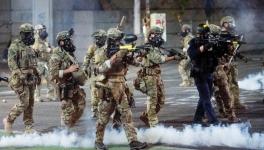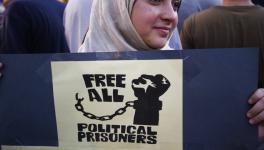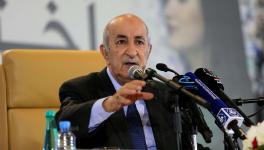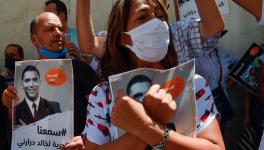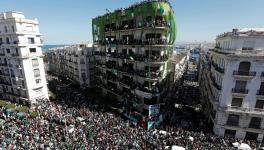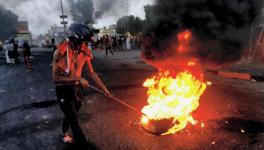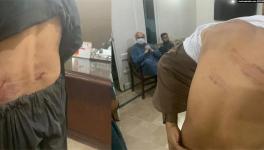Algerian Journalist Khaled Drareni Sentenced to Three Years in Prison for Facebook Posts
Algerian journalist Khaled Drareni leaves the courthouse in Algiers. (Photo: AP)
An Algerian court on August 10, Monday, sentenced journalist Khaled Drareni to three years in jail. Drareni was charged with “inciting an unarmed gathering” and “endangering national unity” based on his Facebook posts. He was illegally held in detention since March 29 while awaiting trial which commenced on August 3. The verdict is being widely condemned by Algerian and international human rights organizations, who compare the current situation to the rule of deposed president Abdelaziz Bouteflika.
Drareni, a prominent journalist, has reportedly been targeted for his coverage of the Hirak protest movement which began in February last year to demand Bouteflika’s resignation. Even after Bouteflika’s ouster, protesters continued to demand political reforms in the country and carried forward the movement which is still ongoing.
The Sidi M’hamed court in Algiers, which sentenced Drareni to three years in prison, also ordered him to pay a fine of 50,000 Algerian Dinars (USD 400). Two other co-accused in Drareni’s trial, Hirak movement activists Samir Benlarbi and Slimane Hamitouche, were also each sentenced to two years in prison. Due to the ongoing coronavirus pandemic, the trial was held via video conferencing.
As part of the evidence, the prosecution used one of Drareni’s Facebook posts in which he expresses concern that the Algerian political system has not changed since the election of Abdelmadjid Tebboune as the country’s new president. Drareni also called on political parties and the Hirak movement protesters to continue their agitation.
During the trial, the prosecution team asked the court for an even harsher sentence for Drareni – a four year prison term, along with a fine and revocation of his civil rights. Drareni strongly denied any wrongdoing on his part. He told the court that he was working as an independent journalist fulfilling his duty of keeping the country’s citizens informed.
Following the verdict, supporters of Drareni, including Hirak protesters as well as dozens of fellow journalists, demonstrated outside the courthouse. They denounced the sham trial and called for his release. Fetta Sadat, one of Drareni’s lawyers, told reporters that “Khaled Drareni was only doing his job of informing citizens. He did not commit a crime. The verdict is proof that Algerian justice is not free but an instrument in the hands of power that can be used to intimidate Algerians.”
Nouredine Benissad, president of the Algerian League for Human Rights, said to reporters, “it’s a very heavy verdict for Khaled Drareni. We are surprised, the case is hollow.” International press freedom advocacy group Reporters Without Borders (RSF) termed the sentence “arbitrary, absurd and violent”. RSF secretary-general Christophe Deloire also said that the verdict was a clear case of judicial persecution against one of the country’s finest journalists. Amnesty International called the sentence a “travesty”, and added that “Khaled Drareni is being punished solely for having bravely exposed the crackdown by the authorities on the rights to freedom of expression and peaceful assembly, including their harsh response to the Hirak protest movement.”
In recent months, the crackdown against journalists, activists, bloggers, lawyers and other Hirak protesters has been intensified by the Algerian government and judiciary in order to suppress and weaken the popular movement. Charges of “threatening national unity” and “being agents of foreign governments”, have been slapped in unfair trials in Algerian courts. Several activists are also in illegal detention while awaiting trial.
The Hirak movement began with Algerians demanding Bouteflika’s resignation after he announced his intention to run for another presidential election. He was eventually forced to withdraw his candidacy and later compelled to resign after the protests grew bigger. Following his ouster, the protesters demanded the removal of government and military officials who had close ties to the Bouteflika regime. They have also demanded major systemic changes to solve issues like corruption, government mismanagement, unemployment, poverty and substandard public services, which are plaguing the country.
Get the latest reports & analysis with people's perspective on Protests, movements & deep analytical videos, discussions of the current affairs in your Telegram app. Subscribe to NewsClick's Telegram channel & get Real-Time updates on stories, as they get published on our website.









